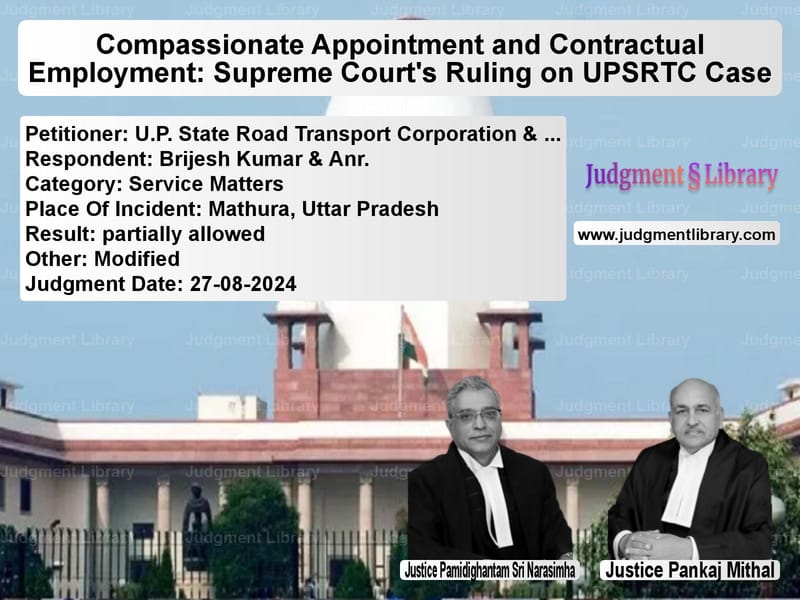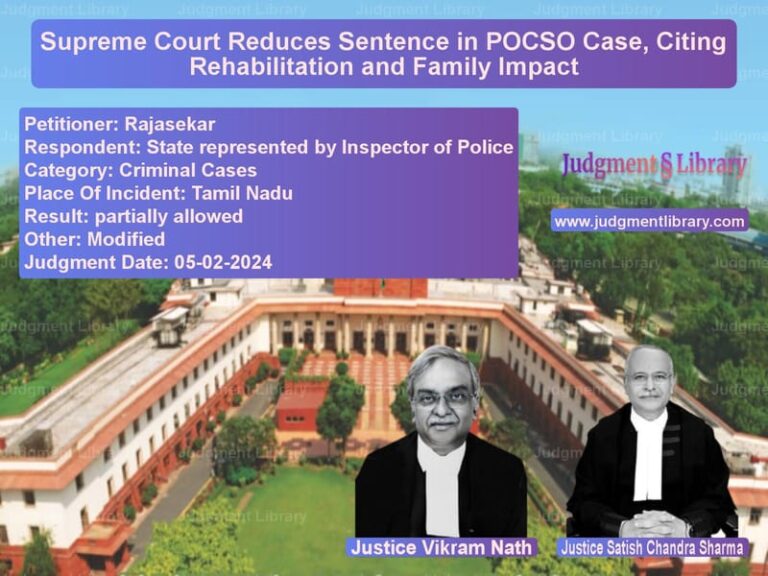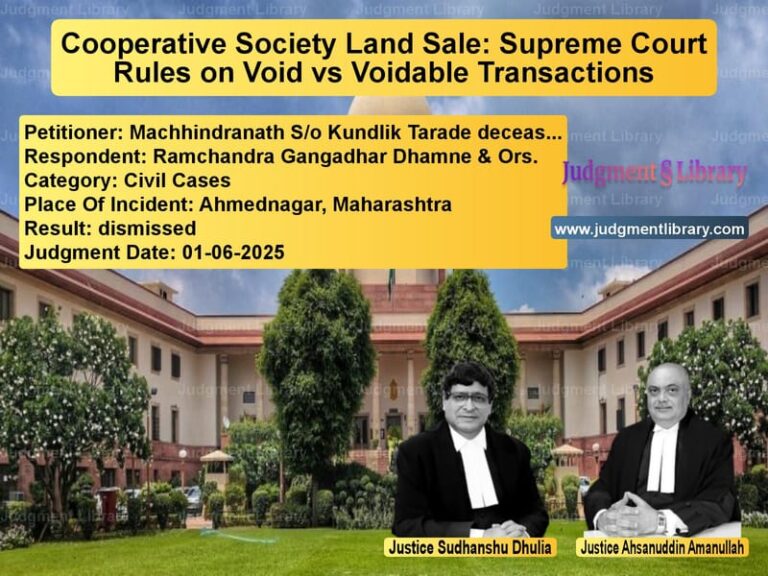Compassionate Appointment and Contractual Employment: Supreme Court’s Ruling on UPSRTC Case
The case of U.P. State Road Transport Corporation & Ors. vs. Brijesh Kumar & Anr. raised important questions about the nature of compassionate appointments, contractual employment, and the principles of natural justice in termination proceedings. The Supreme Court’s ruling in this case provides significant clarity on how appointments under the ‘Dying in Harness Rules’ should be interpreted and whether contractual employees can claim protection against arbitrary termination.
The dispute arose when the respondent, Brijesh Kumar, sought compassionate employment after the death of his father, who was a regular conductor with the UPSRTC. While he was granted a position as a contract conductor, his services were later terminated on grounds of misconduct without holding a disciplinary inquiry. The Allahabad High Court ruled in his favor, treating his employment as permanent under the ‘Dying in Harness Rules.’ The Supreme Court, however, took a different stance while still protecting the respondent’s rights.
Background of the Case
The father of the respondent, Brijesh Kumar, was a regular conductor with the UPSRTC and passed away on October 18, 2003. At that time, Brijesh was a minor, and his mother applied for compassionate appointment on his behalf. However, no action was taken by the authorities. When he turned 18 in July 2008, he obtained the necessary educational qualifications and his mother applied again for his appointment.
There was no immediate response, but in 2012, the UPSRTC offered him a contractual position as a conductor on a ‘preferential basis’ rather than a permanent appointment under the ‘Dying in Harness Rules.’ The respondent accepted the offer, deposited Rs.10,000 as security, and entered into a formal agreement with the UPSRTC.
Termination and Legal Challenge
During his tenure as a contract conductor, the respondent was found guilty of misconduct on multiple occasions, including carrying passengers without tickets and transporting excess luggage without booking. Based on these allegations, his services were terminated on January 30, 2016.
The respondent challenged the termination, arguing that since he was appointed on compassionate grounds, he was entitled to permanent employment, and his termination without a formal disciplinary inquiry was illegal. The Allahabad High Court ruled in his favor, reinstating him on the grounds that his appointment was permanent and could not be terminated without following due process.
Supreme Court’s Observations
The Supreme Court carefully examined whether the respondent’s appointment was truly under the ‘Dying in Harness Rules’ or if it was purely contractual. It made several key observations:
- “There is no dispute to the legal proposition that any appointment made on compassionate basis is in the nature of a permanent appointment and is not liable to be treated as temporary or contractual.”
- “However, the fact remains whether in the instant case, the appointment of the respondent is under the Dying in Harness Rules or is independent of it on contractual basis.”
- “The record reveals that instead of offering compassionate appointment to the respondent under the Dying in Harness Rules, the respondent was extended the benefit of the policy decision dated 09.08.2012 taken in the 188th meeting of the Board of Directors of the appellant (UPSRTC).”
Findings of the Supreme Court
1. Nature of Appointment
The Court noted that the appointment was not made under the ‘Dying in Harness Rules.’ Instead, the respondent was given a preferential contractual appointment as per the UPSRTC’s policy decision of August 9, 2012. The Court observed:
- “A plain reading of the policy decision as contained in letter dated 31.08.2012, the letter of offer dated 19.10.2012 and the agreement dated 12.12.2012, it is crystal clear that the respondent was appointed as a contract conductor on preferential basis being the son of the deceased employee.”
- “There is no reference of any compassionate appointment in any document.”
- “The mere fact that the respondent was appointed on contract basis pursuant to the application for compassionate appointment would not make his appointment to be one under Dying in Harness Rules.”
2. Legality of Termination
Although the Court found that the respondent was not a permanent employee, it also held that his termination was legally flawed due to the failure to follow the principles of natural justice. The judgment stated:
- “The services of the respondent have been determined solely on the ground of misconduct as alleged but without holding any regular inquiry or affording any opportunity of hearing to him.”
- “The termination order has been passed on the basis of some report which probably was not even supplied to the respondent.”
- “No show cause notice appears to have been issued to the respondent.”
- “The termination order is apparently stigmatic in nature which could not have been passed without following the Principles of Natural Justice.”
Final Judgment
The Supreme Court partially allowed the appeal. It ruled that while the High Court had wrongly classified the respondent as a permanent employee under the ‘Dying in Harness Rules,’ the termination order was still invalid due to procedural lapses. The Court stated:
- “We are of the opinion that the learned Single Judge and the Division Bench manifestly erred in law in holding that the respondent was appointed under Dying in Harness Rules.”
- “The High Court has erred factually in treating the appointment of the respondent under the Dying in Harness Rules, though, it is not so.”
- “However, the order dated 30.01.2016 terminating the services of the respondent is bad in law and cannot be sustained.”
- “The appointment of the respondent, in fact, is a contractual appointment entitling him to continue as such in service and to claim regularization if so advised in accordance with law.”
Implications of the Judgment
This ruling has several significant implications for employment law and administrative practices:
- Clarifies that contractual employment, even when offered to dependents of deceased employees, does not automatically qualify as compassionate appointment.
- Affirms that contractual employees cannot be terminated arbitrarily, especially when misconduct is alleged, without following the principles of natural justice.
- Provides guidance for public sector employers to clearly differentiate between contractual appointments and compassionate appointments.
- Highlights the importance of due process in termination decisions, reinforcing the need for proper inquiry and notice.
In conclusion, the Supreme Court’s ruling in this case serves as an essential precedent for cases involving compassionate appointments and contractual employment in government institutions. While it upheld the distinction between the two types of employment, it also ensured protection for employees against unfair dismissal, reinforcing the fundamental principles of natural justice.
Petitioner Name: U.P. State Road Transport Corporation & Ors..Respondent Name: Brijesh Kumar & Anr..Judgment By: Justice Pamidighantam Sri Narasimha, Justice Pankaj Mithal.Place Of Incident: Mathura, Uttar Pradesh.Judgment Date: 27-08-2024.
Don’t miss out on the full details! Download the complete judgment in PDF format below and gain valuable insights instantly!
Download Judgment: u.p.-state-road-tran-vs-brijesh-kumar-&-anr.-supreme-court-of-india-judgment-dated-27-08-2024.pdf
Directly Download Judgment: Directly download this Judgment
See all petitions in Employment Disputes
See all petitions in Termination Cases
See all petitions in Recruitment Policies
See all petitions in Judgment by P.S. Narasimha
See all petitions in Judgment by Pankaj Mithal
See all petitions in partially allowed
See all petitions in Modified
See all petitions in supreme court of India judgments August 2024
See all petitions in 2024 judgments
See all posts in Service Matters Category
See all allowed petitions in Service Matters Category
See all Dismissed petitions in Service Matters Category
See all partially allowed petitions in Service Matters Category







